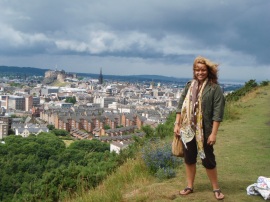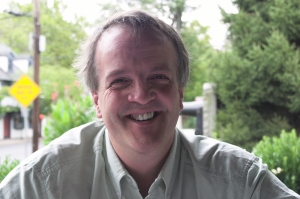More about India! This is a followup to my first post about Dharamsala. Less Hangover-esque shenanigans, more monks and motorcycles.
After I woke up for the second time on New Year’s Day, I asked the coordinator exactly what was in store for me. It was like a terrible rendition of “Who’s On First.”
Me (groggily): “So, where am I volunteering today?”
Him: “Beer.”
Me: “Oh god, no more beer.”
Him: “We are going to beer.”
Me: “No, we drank beer last night…shouldn’t I be in orientation or something?”
Him (insistently): “No, beer!”
Me: “…”
Him: “We are going to beer.”
Me: “Wait…spell that?”
Him: “B-I-R.”
Me: “Bir….is it a place?”
Him: “Yes, we will leave in one hour!”

The view from the home I stayed in
So, we piled into a taxi with one other girl who had just arrived from the US and four volunteers who had been visiting Dharamsala for the weekend and began our trip through the gorgeous Kangra valley. It was about 2.5 hours of winding mountains and valleys with fields of rice and tea and small towns every so often. We took the first day to recover from all of the travelling and get oriented with the small town. Bir is a Tibetan colony so although it is in India, most of the locals are Tibetan. Their primary language is Tibetan (much to the dismay of two girls who had been learning Hindi) and their culture is a bit more westernized than most of India. The Tibetans are mostly businessmen that own shops in the center of town and the Indians tend to do the labor, such as building and making clay. They seem to coexist very well, but there’s a very clear divide between the cultures that I found somewhat unnerving.

Nyingma

Chok Ling
On the second day, we began to teach the monks. We taught at two monasteries, Nyingma and Chok ling. We had been told that we would be assisting teachers who were already following programs, but in reality we were introduced to about 20 incredibly polite but slightly confused boys between the ages of 6 and 17. Many of the boys at Nyingma already spoke decent English, so it was very challenging to find new things to teach them. I taught the more advanced group- by the end of my time there, they were beginning to understand how to arrange sentences into a cohesive story.
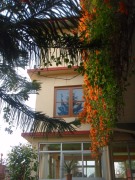
Tea Garden
Bir is a very small town, so you see the same people every day. I continuously ran into the same guys that I had spent New Years’ with, and nearly every night we went out driving, drinking, and dancing. It’s funny because in the US, when someone asks you out for a drink you usually go to a bar. In Bir, you literally go out for a drink- you go buy a bottle of something and sit on a mountain and drink. I much prefer this, to be perfectly honest. Sometimes we ordered food from a nearby Indian restaurant and they brought it out to us while we danced under the stars with music pumping from a car. It was a bit chilly, so sometimes a bonfire was involved as well. Sometimes the other volunteers and I would go for tea at the tea garden down the road. It was beautiful- I can only imagine what it would be like in the summer.
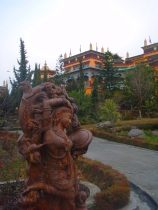
Chok Ling
One experience that I particularly enjoyed was going to morning prayer. We went to our two monasteries as well as another one, also called Chok Ling. The monks were very accommodating- they rolled out mats for us and brought us tea while we sat and listened to their chants. It was wonderfully meditative, and they used some really interesting instruments.
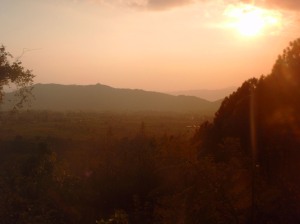
Sunset
Another thing I learned to love (in about four seconds) was motorcycles. Drunk me had made particularly good friends with a local named Jigme on my first evening and he had promised me a ride. Sober me did not remember this, but Jigme did and after my first day of volunteering he was waiting to whisk me off through the jungle. We went for rides every day, sometimes to temples and sometimes just up in the mountains to watch the stunning sunsets. In the evenings, we went to Chauntra, the next town over, where some of the other guys I had met my first evening lived. They taught me to play a popular game called Shok, which is similar to Parcheesi but played with shells and coins and no board. We unintentionally adopted the most adorable puppy, who accompanied us on our late-night dance parties in the mountains.
It’s strange how a culture so different from ours still has so many similarities- going out for dinner and drinking liquor in fields is also a favorite pastime in the small town that I grew up with. We also like to hang around and play games at people’s houses, or just pile into cars and drive somewhere. I think the main difference is how people treat each other. Everyone in Bir was always friendly to everyone else, especially to travellers. I don’t think new people would be welcomed nearly as quickly back home. The Tibetans are also extremely lackadaisical about their business- one day I needed photocopies, and the machine at the shop I usually went to was broken. Rather than just tell me so, the shopkeeper walked me down the street to his competitor and had him make me the copies. Something like this would never happen in the US- but it’s like the idea of competition just doesn’t exist. In any town there are always at least four stores selling the exact same things, but nobody tries to undercut each other or take business. There’s just a really strong sense of community, which I really loved.
More photos from Bir
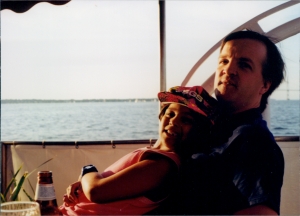 It’s funny how we are conditioned to remember things. I will probably always remember this day as the day my dad died – but despite all my expectations, I have not yet felt any pain on this day. Even the first time three years ago there was no pain – just numbness (and alarm, as my mother’s black eye proved – sorry, mum). Last year I was lucky enough to be with someone who spent the entire day having fun with me. But this year, I was faced with spending the whole day at a yoga studio (meditative by nature) and then the evening in the empty house as my mum and my brother are at Penn State. I was expecting to wake up in a terrible mood, fumble through my teaching, come home, and binge on Indian food while watching Monty Python and old home videos…
It’s funny how we are conditioned to remember things. I will probably always remember this day as the day my dad died – but despite all my expectations, I have not yet felt any pain on this day. Even the first time three years ago there was no pain – just numbness (and alarm, as my mother’s black eye proved – sorry, mum). Last year I was lucky enough to be with someone who spent the entire day having fun with me. But this year, I was faced with spending the whole day at a yoga studio (meditative by nature) and then the evening in the empty house as my mum and my brother are at Penn State. I was expecting to wake up in a terrible mood, fumble through my teaching, come home, and binge on Indian food while watching Monty Python and old home videos…
